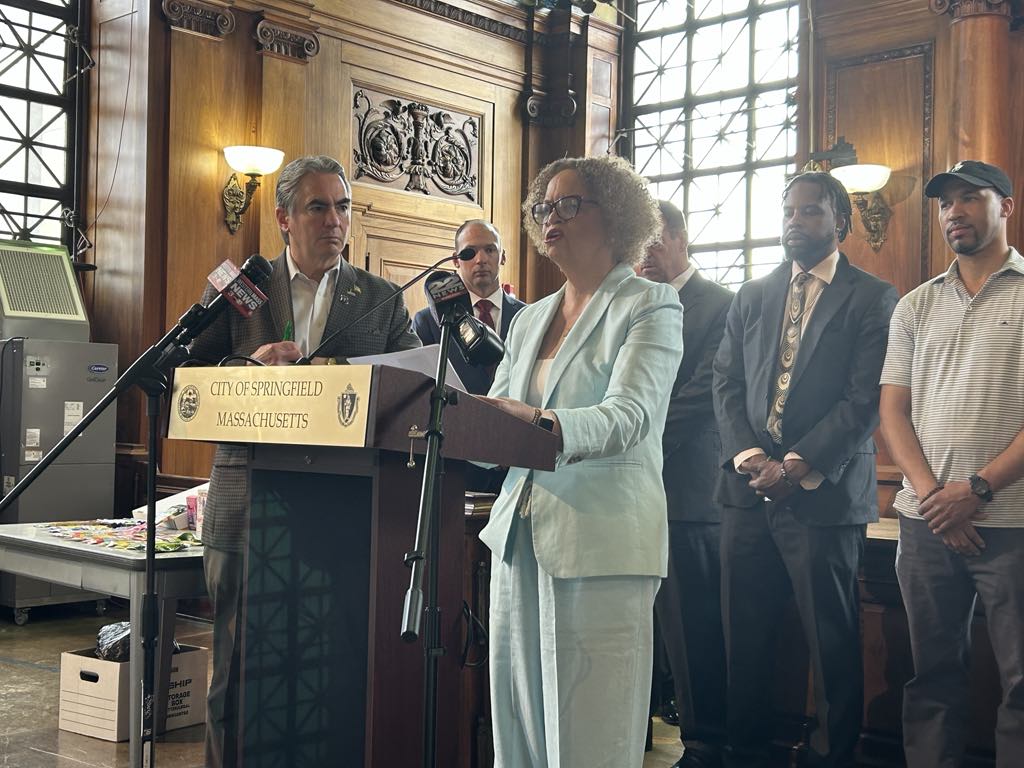Springfield Mayor Domenic Sarno and other city officials gathered on June 4 to introduce an ordinance that would effectively ban the manufacturing, selling and distribution of unregulated and untested THC products illegal. The City Council officially passed the first step of the ordinance during its June 9 meeting. It will now go to the council’s Public Safety committee for further discussion.
Reminder Publishing file photo
SPRINGFIELD — The Springfield City Council is one step closer to passing an ordinance that would crack down on unregulated, untested THC, also known as “gas station weed.”
During its June 9 meeting, the council unanimously passed the first step of the legislation and sent it to the council’s Public Safety committee for further discussion.
First introduced by Mayor Domenic Sarno and city officials at a press conference on June 4, the ordinance would effectively make the manufacturing, selling and distribution of these products illegal.
Officials, including Sarno and Health and Human Services Commissioner Helen Caulton-Harris, argue that these unregulated products are targeting the youth and putting the public health of residents at risk.
“There’s been a host of bad actors that have engaged in unlawful behavior, circumventing the state’s licensure and regulatory process for cannabis and taking advantage of a lack of enforcement by federal and state authorities,” Sarno said at the press conference. “These bad actors are producing unregulated, untested products that contain artificially elevated levels of THC, which create the same effects as legal marijuana and, in many cases, also contain dangerous chemicals and heavy metals, bacteria and mold.”
Currently, dispensaries licensed and regulated by the Cannabis Control Commission can sell marijuana in the state of Massachusetts. However, in recent years, consumers across the state and in the city of Springfield have been exposed to hemp-derived products with “artificially elevated levels of THC” across gas stations, bodegas, liquor stores and retail shops.
Although they carry similar effects associated with typical marijuana products, city officials say these products are more dangerous, not only because of their unregulated nature, but also because they can resemble candy or other snacks due to deceptive packaging.
In some cases, city officials say, the packaging won’t even have ingredients delineating what is inside the product: sometimes, the description of the contents will just say, “100% magic.”
Even though little research about synthetic cannabinoids exists, Caulton-Harris said perpetrators are creating a stronger psychedelic effect in their products by chemically converting the delta-8 and delta-10 components found in trace amounts in THC.
An overview of synthetic cannabinoids from the Centers for Disease Control and Prevention says that these illicit products bring clinical risks like neurological agitation, confusion, seizures, stroke and suicidal thoughts, among other things.
“I believe [these drugs] are considered gateway drugs,” Caulton-Harris said at the June 4 press conference. “When our youth have access to these kinds of cannabinoids or synthetic cannabinoids, the impact for their future is something we all should take extremely serious.”
Aside from making the drugs illegal, the ordinance would also authorize police and health inspectors to confiscate the product and institute a $300 fine per item, the highest the city can implement, according to Springfield City Solicitor Stephen Buoniconti.
During the June 9 meeting, Ward 6 City Councilor Victor Davila indicated that the council will likely “sink its teeth” further into the punishment aspect of the ordinance.
“I think that $300 is just the beginning of the conversation,” he said.
Ward 1 City Councilor Maria Perez said that as a parent, she was shocked to hear about the types of products that are sold at these businesses.
“What I could say from a parent perspective … what I have read, it’s very scary,” said Perez, who was in attendance at the June 4 press conference with Ward 4 City Councilor Malo Brown. “Any child with any age can go and take this product as a candy and the parents think it’s a candy that is being sold to the child.”
As of right now, Caulton-Harris said there are about 12 to 13 places in Springfield that are selling these illegal products. She shared that the city knows where they are and what products are being sold there, but did not divulge the names of the places.
The council’s Public Safety committee will talk more in-depth about the ordinance at its next meeting, and then it is expected that the full council will return to officially vote the ordinance into law.
- Ryan Feyre
- Ryan Feyre
- Ryan Feyre
- Ryan Feyre
- Ryan Feyre
- Ryan Feyre


